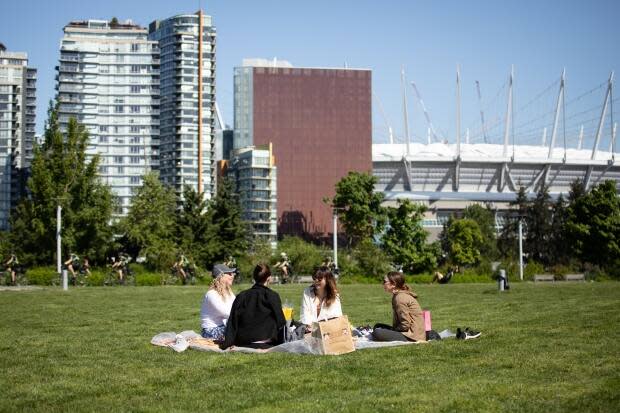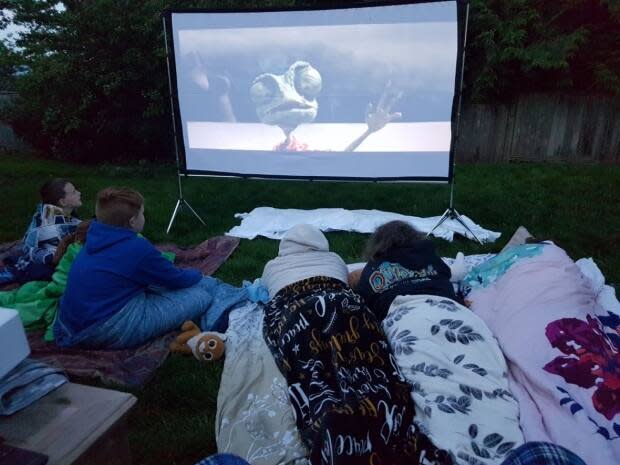Conflicted about stepping out of isolation? You're not the only one

In the hours after British Columbia shifted into the first phase of its reopening plan, many rushed to return to as much of their old lives as they could under the loosened rules.
Some booked a table at their old haunt for catch-up drinks with a friend or invited their parents over for a simple dinner at the kitchen table instead of ordering takeout for a lawn-chair soiree in the park.
Others weren't rushing to change anything.
"I feel terrified," said Anna Burns, 32, a journalism student who's been taking classes virtually from her home in Langley, B.C. "I personally am definitely not ready for that. There's a lot of anxiety and a lot of unknown."
As B.C. begins moving toward its goal of lifting virtually every one of its public health restrictions by early September, countless residents are feeling hope for the first time in more than a year.
But for others, the idea of stepping out of isolation and back toward normal life seems impossible to get their head around — even though they feel like they should be elated.
"Change is exciting and even great changes can come with anxiety and people can still be a bit uncertain about how their future is going to look and unfold," said Joelle LeMoult, an assistant professor of psychology at the University of British Columbia.
The reopening plan said activities like meeting family and friends indoors, travelling to different parts of the province or visiting a movie theatre could all be possible in B.C. by mid-July — so long as case counts and hospitalizations fall while vaccinations keep rising.
Even while small get-togethers were allowed indoors as of Tuesday, squeezing into a cozy apartment with a few friends or sitting in a bustling restaurant can feel awkward and strange after 15 months of training the brain to perceive those settings as risky.
"Just driving past restaurants and seeing so many people in there ... your hands start sweating, there's just so many people," said Rhema Plunkett, 17, speaking from her room in Chilliwack, B.C. "It's pure worry."
After four rounds of bronchitis last year, Plunkett has been isolating at home since October with her parents, five siblings and their border collie, Kylo Ren. She hasn't seen her boyfriend since October, but she's not rushing to see him until her first dose of vaccine has had two weeks to take effect.

LeMoult said trepidation isn't surprising.
"We've been told for so long, the last year, that all of these things were dangerous. It's kind of a hard thing to suddenly today say, oh, now they're OK," said LeMoult. "It can take your feelings some time to catch up with the reality of what we're being told."
Dr. Maryam Zeineddin, a family doctor specializing in lifestyle counselling, said many have been in a constant state of fight or flight for months. It takes time, she said, for the autonomic nervous system to calm down after that level of chronic stress.
"It will take a while," she said.
"My own 10 year-old daughter, I was on a beach, and she said, 'Mummy, there's way too many people on the beach," added Zeineddin, who lives in West Vancouver. "Instead of shaming it, instead of pushing through it, you take baby steps.

Public health officials acknowledged Tuesday some might choose to take extra, personal precautions — especially since the pandemic had disproportionate effects on different people, depending on factors like age, race and socioeconomic status.
Many haven't had a dose of vaccine, others live with omnipresent pre-existing health conditions and some have vulnerable family members to consider.
LeMoult and Zeineddin said people should ease back into society when they're ready, without pressure to match pace with everybody else.
"Just because they're able to make all of these changes doesn't mean they have to," said LeMoult.
"Choosing maybe one or two changes at a time that feel comfortable for each individual to tackle, I think, is a really good way to do it, rather than saying, 'Today I'm going to go back and change my entire life from what it's been.'"
Burns, a self-described rule follower, said she'll expand her bubble of three eventually. In the new year, virtual learning will end and she'll move to Calgary to continue her studies.
"I'm going to start exposing myself in a way that I'm comfortable with. I know I can't live in a hole my entire life ... but I'm probably going to be a lot slower than most people are."

